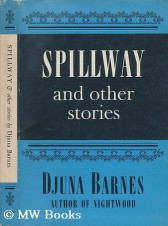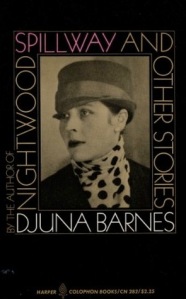“You see,” she continued, “some people drink poison, some take the knife, others drown. I take you.”
As anybody familiar with the singular artistic vision of Djuna Barnes is well aware, reading anything she wrote is like entering a type of parallel universe—one that resembles our own in many ways, but also one that is no longer able to repress and erase what is odd or sad or grotesque, particularly in regards to the human condition. As an astute commentator much smarter than me has noted, reading Barnes is to enter a textual space “in which the normative becomes, for once in history, the excluded, the taboo, and the unmentionable” (Boone 235).
Barnes was a prolific artist and her written work encompasses journalism, interviews, novels, plays, poetry, criticism, and a copious amount of wittily irascible letters exchanged with just about all of the great cultural luminaries of the 20th century (unfortunately a collection has yet to emerge, so for now one can catch glimpses of them in the countless biographies and commentaries detailing the modernist era).
 She was also, of course, a short story writer, and this was my first extended encounter with her short-form fiction work. Once one becomes familiar with Barnes’s baroque style and bleak worldview it is difficult to not immediately recognize her writing, which helps in being able to contextualize these stories with all of the other modes she expressed herself in. But I also found them different in a crucial way as well, for if her novels and longer fiction feel like a meander through a shape-shifting dream world, the short stories operate quite differently. Within these little slips of short stories–many no more than several pages long–Barnes is somehow able to contract and compress entire cosmos of feeling, affect, experiences, and histories (of both a personal and cultural nature) into the space of several pages.
She was also, of course, a short story writer, and this was my first extended encounter with her short-form fiction work. Once one becomes familiar with Barnes’s baroque style and bleak worldview it is difficult to not immediately recognize her writing, which helps in being able to contextualize these stories with all of the other modes she expressed herself in. But I also found them different in a crucial way as well, for if her novels and longer fiction feel like a meander through a shape-shifting dream world, the short stories operate quite differently. Within these little slips of short stories–many no more than several pages long–Barnes is somehow able to contract and compress entire cosmos of feeling, affect, experiences, and histories (of both a personal and cultural nature) into the space of several pages.
Not that this ever seems the case at the beginning of each story. Barnes’s general technique is to introduce several eccentric characters, establish a setting and then embroider these elements in a delicate meshwork of commentary and observations that are unexpected and incisive and beautiful. Often they hardly seem like “stories” at all, but rather character sketches, all evocative description and not much else. But that impression is deceptive, for almost like clockwork in the closing lines something inevitably happens—a snippet of dialogue perhaps, or a turn of phrase—and suddenly everything comes together in a brief flash of insight. It’s not exactly that everything seems to “fall into place,” or it is like a puzzle with an “aha!” conclusion, or even that it feels like an epiphany, but somehow everything always seemed to come together in the very last moment, almost improbably, suddenly making (some kind of) sense of everything that came before
But “sense” isn’t even the right word, as it’s something more ambiguous and indescribable than that. But whatever it is it’s extremely potent: there were several times upon reaching the end of a story that I had to set the book down for a few minutes, blown away by an unexpected wave of emotion that just coursed through me. How? I likely wouldn’t have been able to tell you. Why? Glancing back through the stories now, I can’t exactly tell anymore. And yet somehow, fleetingly, in the moment of reading these stories they would somehow reveal an emotional coherence, and often to devastating effect.
Needless to say, it didn’t take long for me to become fully convinced that Barnes is one of the great short story writers, even if she is rarely anthologized, and I’d be quite surprised if she’s ever included as a “how-to” example in a guide to writing a “good” short story. Because by any standards these stories shouldn’t work. But somehow they do, and the results are unlike just about anything else I’ve ever encountered or had the great pleasure to read.
[A version of this review was originally posted on Goodreads.]
NOTE
Spillway was originally published in 1923 under the title A Book, and a new edition was published in 1929 under title: A Night Among the Horses.
WORKS CITED
Barnes, Djuna. Spillway and Other Stories. 1923. New York City: Harper & Row, 1972.
Boone, Joseph Allen. Libidinal Currents: Sexuality and the Shaping of Modernism. Chicago: University of Chicago, 1998.

